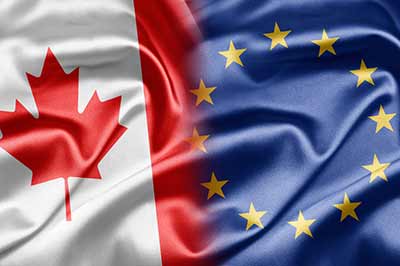The Euro to Canadian Dollar (EUR/CAD) exchange rate gave up some its earlier gains following the release of Canadian data.
Statistics Canada said the country’s trade deficit widened to C$0.65 billion in December from C$0.34 billion in November, whose figure was revised from a previously estimated deficit of C$0.64 billion.
Analysts had expected the trade deficit to widen to C$1.00 billion in December.
Earlier the Euro to Canadian Dollar (EUR/CAD) exchange rate advanced on Thursday after the European Commission announced that it had upwardly revised its economic growth forecasts for the Eurozone economy.
The ‘Loonie’ remains under pressure against its major peers as oil prices continued to remain weak and as domestic data came in well below economist expectations.
Canada’s Ivey Purchasing Managers Index (PMI) expanded at its slowest pace in close to four years in the first month of 2015, adding to concerns over the strength of Canada’s economic outlook.
Oil prices did tick higher on Thursday after they were supported by a softer US Dollar. The rise however was not sufficient to counter concerns over the Canadian economy.
Data released later in the session could offer some support to the ‘Loonie’ if it shows that the nation’s trade deficit narrowed. Some economists are expecting the deficit will be wiped out and make a surplus instead. Others think the deficit will widen further.
More Canadian Dollar Losses Forecast
‘In January, the Canadian Dollar (CAD) was the worst-performing primary currency, losing 9% against the US Dollar and marking the largest monthly losses since the height of the financial crisis. We are likely to see ongoing weakness in 2015, with a substantial year on year depreciation,’ said Bank of Nova Scotia chief currency strategist Camilla Sutton.
Friday’s session will see the release of a number of Canadian data reports including building permits and unemployment data. A surprise rise in the jobless rate will likely send the ‘Loonie’ tumbling against all of its major peers.
Eurozone Growth Forecasts Improved
The Euro meanwhile made gains against the majority of its most traded peers after the European Commission (EC) upgraded its growth forecasts for the Eurozone. Despite the uncertainty created by the standoff between Greece and its creditors the commission predicts that the single currency bloc’s economy will expand by 1.3% this year and by 1.9% in 2016. Only three months ago, the EC was predicting growth of 1.1% for 2015 and 1.7% next year.
Unemployment across the region however is expected to remain above 11% and the threat of deflation will continue to impact the Eurozone.



